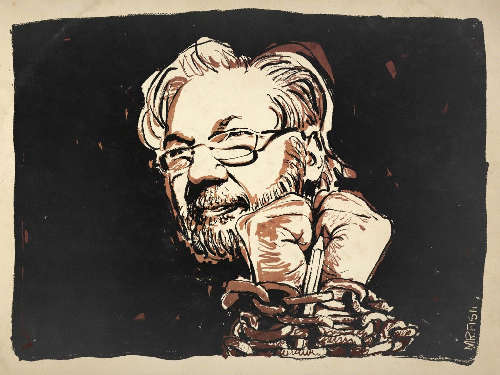From Scheer Post
As is clear from the memoir of one of his attorneys, Michael Ratner, the ends have always justified the means for those demanding his global persecution.
Shortly after Wikileaks released the Iraq War Logs in October 2010, which documented numerous US war crimes including video images of the gunning down of two Reuters journalists and 10 other unarmed civilians in the Collateral Murder video, the routine torture of Iraqi prisoners, the covering up of thousands of civilian deaths and the killing of nearly 700 civilians that had approached too closely to US checkpoints the towering civil rights attorneys Michael Ratner and Len Weinglass, who had defended Daniel Ellsberg in the Pentagon Papers case, met Julian Assange in a studio apartment in Central London, according to Ratner's newly released memoir "Moving the Bar."
Assange had just returned to London from Sweden where he had attempted to create the legal framework to protect Wikileaks' servers in Sweden. Shortly after his arrival in Stockholm, his personal bank cards were blocked. He had no access to funds and was dependent on supporters. Two of these supporters were women with whom he had consensual sex. As he was preparing to leave, the Swedish media announced that he was wanted for questioning about allegations of rape. The women, who never accused Assange of rape, wanted him to take an STD test. They had approached the police about compelling him to comply. "I did not want to put any charges on Julian Assange," texted one of them on August 20 while she was still at the police station, but "the police were keen on getting their hands on him." She said she felt "railroaded by the police." Within 24 hours the chief prosecutor of Stockholm took over the preliminary investigation. He dropped the rape accusation, stating "I don't believe there is any reason to suspect that he has committed rape." Assange, although not charged with a crime, cancelled his departure and remained in Sweden for another five weeks to cooperate with the investigation. A special prosecutor, Marianne Ny, was appointed to investigate allegations of sexual misconduct. Assange was granted permission to leave the country. He flew to Berlin. When Assange arrived in Berlin three encrypted laptops with documents detailing US war crimes had disappeared from his luggage.
"We consider the Swedish allegations a distraction," Ratner told Assange, according to his memoir. "We've read the police reports, and we believe the authorities don't have a case. We're here because in our view you are in much more jeopardy in the US Len [Weinglass] can explain why."
Assange, Ratner recalled, remained silent.
"Wikileaks and you personally are facing a battle that is both legal and political," Weinglass told Assange. "As we learned in the Pentagon Papers case, the US government doesn't like the truth coming out. And it doesn't like to be humiliated. No matter if it's Nixon or Bush or Obama, Republican or Democrat in the White House. The US government will try to stop you from publishing its ugly secrets. And if they have to destroy you and the First Amendment and the rights of publishers with you, they are willing to do it. We believe they are going lto come after Wikileaks and you, Julian, as the publisher."
"Come after me for what?" asked Julian.
"Espionage," Weinglass continued, according to the memoir. "They're going to charge Bradley Manning with treason under the Espionage Act of 1917. We don't think it applies to him because he's a whistleblower, not a spy. And we don't think it applies to you either because you are a publisher. But they are going to try to force Manning into implicating you as his collaborator. That's why it's crucial that Wikileaks and you personally have an American criminal lawyer to represent you."
Ratner and Weinglass laid out potential scenarios.
"The way it could happen," Ratner said, "is that the Justice Department could convene a secret grand jury to investigate possible charges against you. It would probably be in northern Virginia, where everyone on the jury would be a current or retired CIA employee or have worked for some other part of the military-industrial complex. They would be hostile to anyone like you who'd published US government secrets. The grand jury could come up with a sealed indictment, issue a warrant for your arrest, and request extradition."
"What happens if they extradite me?" asked Julian.
"They fly you to where the indictment is issued," Weinglass told Assange. "Then they put you into some hellhole in solitary, and you get treated like Bradley Manning. They put you under what they call special administrative measures, which means you probably would not be allowed communication with anyone. Maybe your lawyer could go in and talk to you, but the lawyer couldn't say anything to the press."
"And it's very, very unlikely that they would give you bail," Ratner added.
"Is it easier to extradite from the UK or from Sweden?" asked Sarah Harrison, who was at the meeting.
(Note: You can view every article as one long page if you sign up as an Advocate Member, or higher).






